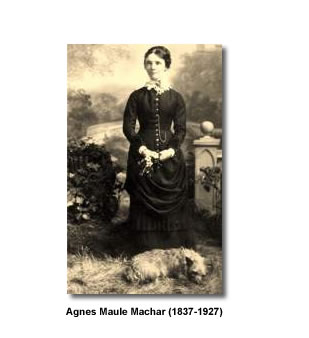AGNES MAULE MACHAR (1837-1927)
by Christa Zeller
Agnes Maule Machar, outspoken campaigner for social justice, access to education for women, and Christian belief, was born in Kingston, Ontario, where her father, Dr John Machar, was a Presbyterian minister and principal of Queen’s University. The young Agnes consequently grew up in a home that provided a rich intellectual and religious environment, and in which prominent social reformers and Christian thinkers were frequent guests. Taking her example from her mother, Machar became involved at an early age in philanthropy and in the work of numerous reform and charitable organizations, from the Kingston Humane Society to the National Council of Women.
Machar’s activism influenced her writing, which is inflected by her strong social consciousness, her commitment to Christian humanism, her clear faith, and her desire to lead her readers to Truth. In an 1894 piece written for The Week she argued passionately, “Above all Canada wants writers with noble ideals. The tendency of too many writers, now-a-days, is to lose these under the undermining influence of a debasing materialism, but without the noblest ideals, the noblest work can never be done.” Most of Machar’s writing originally appeared under the pen name Fidelis, chosen, she said, because “Faithfulness is the quality I most value, and care most to possess.” Agnes remained unmarried throughout her life, dividing her time between Kingston and Ferncliffe, her cottage in Gananoque. She devoted herself to advocating reform causes and writing literature to help bring about change. Machar’s efforts to galvanize women to political action, for instance, are depicted in humorous form in the poem “A Woman’s Meeting.”
Machar published several histories and biographies, nine novels – of which Roland Graeme (1892) is of particular interest for its treatment of social issues – and contributed frequently to American and Canadian periodicals such as Century Magazine and the Canadian Monthly. A selection of her poetry, published as Lays of the “True North” and Other Canadian Poems (1899) was so popular that it led to an enlarged edition (1902). The poems bear testimony to Machar’s patriotism and to the joy, calm, and sense of wonderment she derived from nature. A stanza in the poem “September among the Thousand Islands,” for instance, which celebrates the environment of her beloved Ferncliffe, reads, “So calm, so tranquil [the river’s] expanse; / No ripple on its peaceful breast; / It might be sea of fairyland / By some strange magic laid to rest; / And the grey, hazy islands seem / The vision of a passing dream.” Fellow poet Charles G.D. Roberts lauded Machar for her “firm command of musical and simple lyric forms, and of vivid description.” Machar also wrote historical poems about heroic Canadian figures such as Laura Secord and Louis Riel.
Over time, Machar’s poetry has lost its popularity. Poet Ethelwyn Wetherald, who published the first study of Machar’s work in the 1890s, comments that “some of her poetry is produced by a collaboration of the artist and moralist within her, and that we are not so grateful for the moral as we are for the image.” If Machar’s tendency towards didacticism sometimes spoils the poetic effect, her contributions to Canadian intellectual life are beyond doubt.
|



